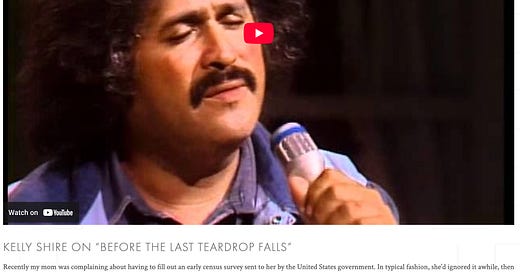Sorry for the double-essay day (one should never say sorry for two essays in one day), but yesterday’s post on Chelsea Biondolillo’s Second Chanceness essay didn’t go out, we realized just this morning. So you are getting doubled up on Friday, March 14th.
Yesterday may have been about joy, but today is Kelly Shire on Freddy Fender day, like the post title says. This is a favorite, a writer who genuinely liked their Badness artist (about 10-20% of the writers for that tournament did) and wrote beautifully about a so-called bad song by Fender, “a significant Texas musician.” This happens a lot with the Fadness tournaments too: what some people might consider a bad song or a novelty song or a “one hit wonder” (which is a technical term, meaning one and only one song to chart in the US Billboard Top 40) obscures an artist with a deep and complex history. I mean, technically Crowded House are one-hit wonders. Midnight Oil! Divinyls (who, as the Aussie fans reminded us during the original March Fadness, are a serious endeavor down under)! It’s easy to laugh at a song that misfires or doesn’t quite fit the cultural expectations for a hit, especially 30-40 years later, and our writers mostly tried to treat the musicians gently (good job, writers) while acknowledging the essential badness of the song. Of course some of these “bad” songs were actually good songs, but that’s how this works! Some hits are bad. Some bad songs are good. The winner of the tourney, as Shire notes below, was truly a good-bad song, and if you missed Elena Passarello on the truly WTF “Muskrat Love,” you can read it again here or catch it in our book coming out in March 2026.
Anyhow, we thought we’d send you back to this one on a rainy morning in Tucson, so take it away, Kelly Shire:
Last week, I read a post on the wonderful Neko Case’s Substack, “Entering the Lung.” She was reflecting on her Ukrainian heritage, and of feeling so very removed from family history and not-so-distant ancestors who emigrated to the U.S. “We were ghost people,” Case writes of her family. “Not talking about the unspeakable things that pushed us to the United States. I still don’t know why we came. I only know that whatever it was, it was awful.” I related to every word of her piece—the sadness of that old American story, cultural annihilation, and self-inflicted.
Five years on from writing about Freddy Fender, I feel a mix of anger and regret when re-reading my piece. I’ve had another five years to mull over what it means to have been raised in my Mexican-American family. My own ghost family, where nobody talked about history, or ancestors, or why they came to the U.S. from northern Mexico. (The Mexican Revolution, probably, but as usual, I’m only guessing.) Five years to learn about generational trauma, and watch how that’s played out amongst various relatives.
I’m mad at myself for letting my grandparents off the hook so easily, and sinking into the warm nostalgia of 1970s TV consoles, playing ‘70s variety shows, while we all visited happily under their roof. My grandparents were not bad people by a long shot, but neither were they very happy, especially my grandmother. I might have touched on the shame they instilled into their offspring about speaking their native tongue—and how the amusement they displayed at hearing “Before the Next Teardrop Falls” over the airwaves was a front for some more uncomfortable feelings. In hindsight, their amusement falls uncomfortably close to condescension. I went easy on our collective past; easy as the people I quoted, sharing their histories in the YouTube comments of Fender’s songs, memorializing dead relatives as they sat watching and listening.
Personal history aside, I’m also mad at myself for not championing Fender’s song a little harder. That was probably due to the gray area of the Badness competition in general. I went into the writing a little unclear about whether I should be arguing for my song to be considered The Worst, merely Not That Bad, or So Bad It’s Awesome. (The winner, Muskrat Love, is definitely an argument for the latter.) I never believed that “Teardrop” is a bad song at all. I think my theory of it edging awfully close to being a novelty song still holds water—again, it’s the Spanish that sets it apart, and makes the song work. Without it, it’s merely a catchy chorus, without any of the gravitas. I could’ve done a deeper dive into the likelihood of the song becoming a hit in the current political climate; how Fender and his Chicano beer-pansa would make an even more unlikely pop star now than in the mid-70s, despite the popularity of so many other Spanish-language artists in the years between.
As for regrets, I wish I’d spent more sentences focusing on Fender the artist, and all the music he put out post-Teardrop. (And also post “Wasted Days and Wasted Nights”). I’m especially thinking of the work he did with his group The Texas Tornadoes, and the great Flaco Jimenez. Although, looking over their discography, it strikes me that singles, like “Hey Baby, Que Paso?” and “Who Were You Thinkin’ Of” also veer pretty close to being novelty songs themselves. Either way, Fender was, is, a significant Texas musician, and his Badness song was never going to triumph as the Baddest of them all. —Kelly Shire
Read it again for the first time:
See you tomorrow with another forgotten banger, this one from one of our Committee Members.
Ander & Megan





